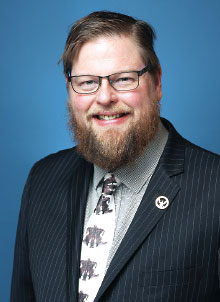Record Number of Anti-Trans Bills Filed in States This Year
Abstract
APA has expressed firm opposition to bills that would criminalize physicians for providing gender-affirming care to transgender and gender diverse patients—care that many psychiatrists argue is lifesaving.
Grant Allen, M.D., a pediatrician in Florence, Ala., had a patient who made it clear at the age of 2 that she knew she was a girl. Since then, she has received counseling and support from her medical team. As she’s gotten older and progressed through school, she’s done very well, Allen said, especially with managing her anxiety, which transgender patients commonly experience.
But the week Alabama’s legislature began discussing a bill that would make it a felony for her doctors to care for her, Allen’s patient had a 14-hour psychotic event.
“This legislation does real harm to real people who already feel isolated,” Allen said. “They feel they’re on the margins of society, and there are so few places where they feel supported. Taking away their medical care is going beyond backwards.”
Allen’s patient is just one of many whose lives could be upended by legislation filed in many states. According to the Human Rights Campaign, there have been more than 250 anti-transgender bills—a record number—filed in more than 20 states this year. Some criminalize physicians for providing gender-affirming care, such as in Alabama, while others prohibit trans youth from participating in sports teams or accessing restrooms that align with their gender identities.
While the bills hold many similarities, some stand out. Bills filed in Texas’s House and Senate would change the definition of child abuse to include providing gender-affirming care and would apply to anyone involved in providing such care, including parents and guardians. In North Carolina, a bill would require state employees to notify parents or guardians in writing if their child displayed “gender nonconformity, or otherwise demonstrates a desire to be treated in a manner incongruent with the minor’s sex.”
“This state-sanctioned prejudice communicates a clear hostility to patients, many of whom have already experienced this hostility from family, friends, and beyond,” said Jacob Lee, M.D., a PGY-3 psychiatry resident at the University of Missouri-Kansas City and executive board member of the Missouri Psychiatric Physicians Association. In Missouri, multiple anti-transgender bills have been filed this year, and Lee provided testimony against a bill that would prohibit physicians from administering any medical or surgical treatment for the purpose of gender reassignment to patients under 18. He testified against similar legislation last year.
The concerns over the anti-transgender bills have left many organizations, including APA, adamantly expressing their opposition.
“We recognize health as a basic human right for every person, regardless of gender identity or sexual orientation,” stated a news release issued by APA and its five partner organizations, collectively known as the Group of Six. “Patients and their physicians, not policymakers, should be the ones to make decisions together about what care is best for them.”
Setting a Dangerous Precedent
Across the country, anti-transgender bills are being met with varying levels of success. In some states, they linger in committees, unlikely to be taken up before the state’s legislative session ends. But in others, they are creeping through the legislature or have already passed.

Decision-making in medicine is nuanced and involves more than all-encompassing rules, says Lindsey Wilbanks, M.D. Legislation should reflect the fact that medicine is not one-size-fits-all.
In Arkansas, Gov. Asa Hutchinson, a Republican, vetoed the Save Adolescents From Experimentation (SAFE) Act, which prohibits health care professionals from providing gender-affirming treatment, such as hormone therapy and puberty-blocking medications or referring patients to other physicians for gender-affirming services. It even applies to patients who have already started such treatments. The veto, however, was overturned by the state’s legislature, and the bill was enacted on April 13. The American Civil Liberties Union announced in a statement that it plans to challenge the law in court.
During a press briefing, Hutchinson said the SAFE Act represents “government overreach.” He continued: “The state should not presume to jump into every ethical health decision.”
Lindsey Wilbanks, M.D., a forensic psychiatrist and the legislative representative with the Arkansas Psychiatric Society, wrote a letter urging Hutchinson to oppose the SAFE Act. It concerns Wilbanks for numerous reasons, she told Psychiatric News, including the impact it will have on transgender youth, who already have a high risk of mental illness and suicide. Further, one of the most concerning aspects is the dangerous precedent the law sets.
“This is a step in the wrong direction,” she said. “Decisions in medicine should be made between patients and their doctors, as well as their parents or guardians [for youth] under 18.” Questions of whether physicians are providing appropriate care to their patients are for the Arkansas State Medical Board to answer, not the legislature, she said.
Harming the Therapeutic Alliance
In Alabama, a bill titled the Vulnerable Child Compassion and Protection Act would prohibit health care professionals from providing gender-affirming treatment. The Alabama Psychiatric Physicians Association opposes the bill, noting in its monthly newsletter that patients who have gender dysphoria and no support have a higher risk for suicidal ideation and that, while the government serves a valuable role in protecting public health, it should not interfere with the patient-physician relationship.

In Alabama, the legislation approaches clinical care as though clinicians are using sledgehammers to fit a square peg into a round hole, says Paul O’Leary, M.D.
The therapeutic alliance between a patient and physician is extremely important, explained Paul O’Leary, M.D.*, chair of the APA Assembly Nominating and Rules committees, a clinical assistant professor at the University of Alabama at Birmingham, and president of the Birmingham Psychiatric Society. “If you want patients to do better, you have to create a therapeutic alliance with them so they trust that you have their best interests at heart,” he said. “Whenever you put up barriers to addressing what’s at the root of the distress, you impact the alliance and that patient’s care.”
O’Leary and Heather Austin, Ph.D., president of the Alabama Psychological Association, which also opposes the bill, said the legislation represents a basic misunderstanding of how clinical decisions are made and, specifically, how transgender youth are treated.
“At its core, this is a human rights issue,” Austin said. “Our youth today think of gender as a more fluid construct than we did when we were younger, and that has to be respected and appreciated.”
Legislation Would Remove Lifeline
In July 2020, APA issued a position statement on the treatment of transgender and gender-diverse youth. In the statement, APA expressed its support of gender-affirming and supportive treatment, including appropriate mental health services, and opposed “all legislative and other governmental attempts to limit access to these services for trans and gender-diverse youth.”
With the swell of anti-transgender legislation this year, Evan Eyler, M.D., who was the principal author of APA’s position statement, said he worries about the mental health of trans youth. “Many adolescents who are trans refer to puberty-blocking medications as a lifeline, and that can be literally true,” Eyler told Psychiatric News in an email. Eyler is a professor of psychiatry at the Robert Larner, M.D., College of Medicine at the University of Vermont and has done clinical work with people who are trans or gender nonconforming for over 25 years.
Bills that would prohibit trans youth from playing on sports teams that align with their gender identifites are yet another means of making life difficult for transgender youth, Eyler pointed out. Such bills have been filed all over the country and so far have passed this year in Arkansas, Tennessee, and Mississippi. There are numerous resources available that address concerns regarding gender identity and athletics, and the National Collegiate Athletic Association has policies regarding the participation of trans athletes, Eyler said. “This has already been studied extensively, and reasonable policies have been developed,” he said.
The anti-transgender legislation sends a chilling message to transgender youth, Eyler said. “The message of these bills is, essentially, ‘You shouldn’t be who you are’ or ‘Being trans is so unacceptable that we need to pass laws against you,’ ” he continued. “This is another enormous psychological burden added to an already vulnerable group of youth.” ■
*This was the last story for which Paul O’Leary, M.D., provided an interview for Psychiatric News before he passed away on May 12. APA will sincerely miss Dr. O’Leary, who was a passionate advocate for his patients and the field of psychiatry.



